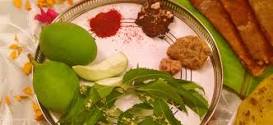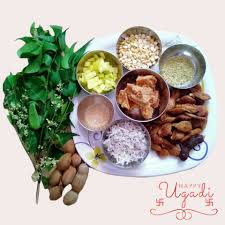Lesser Known Facts About Ugadi
Hindus in some states across India celberate New Year’s Day as Ugadi. Karnataka, Maharashtra, Andhra Pradesh, and Telangana celebrate the first day of the Hindu lunisolar calendar of Chaitra month as their New Year day. It typically falls in the months March and occasionally in April – the best times to travel.
Preparations for this auspicious day begin a week ahead. People clean the entrance of their houses. Water and cow dung paste are used to paint the floor in different designs, adding flower and leaves. Drawing colourful patterns on the floor, decoations with banana leaves, visiting temples, giving charity to the poor, excahnging gifts and having festive food called pachadi are the most trendy ways by which people welcome this auspicious day. Read on to know more about Ugadi.
What does Ugadi mean?

The name Ugadi also called “Yugadi”, is derived from the Sanskrit words ‘yuga’ meaning age and ‘adi’ meaning beginning, which together means “the beginning of a new age”. Ugadi specifically refers to the start of the existing age in which we are living – the Kali Yuga which began when Lord Krishna left the world. Legend says Lord Brahma created the world on this day.
What does Ugadi signify?
Ugadi signifies the arrival of Spring and warmer weather. It is a joyous festival bringing growth and prosperity.
It is also the harvesting time for Rabi crops and simultaneously peak season for mangoes to flood the market.
Where is Ugadi celebrated?

Since so many states celebrate Ugadi, the festival takes on a different celebration nd customs dependin g on the stae. Indians celebrate Ugadi in many states and by many names. In the states of Andhra Pradesh, Telengana and Karnataka people call it Ugadi or Yugadi; the Marathi people celebrate it as Gudi Padwa and the Marwadis of Rajasthan call it Thapna. The Sindhis celebrates as Cheti Chand. The Manipuris call this day Sajibu Nongma Panba.
What do we mean by International celebrations of Ugadi?
Ugadi is celebrated internationally as well in countries like Indonesia and Mauritius. The Hindu community in Indonesia, who live in and around Bali celebrate New Year on this day and call Ugadi Nyepi.
Food eaten during Ugadi

Bevu Bella or Pachchadi are traditional Ugadi dishes. It is a concoction made out of six ingredients, each symbolising an emotion.It is consumed by all the members of the family. These include the neem buds & flowers symbolising sadness, jaggery symbolising happiness, green chilli anger, salt denoting fear, tamarind marks disgust and unripened mango here means surprise.
These different sweet and sour tastes intend to remind people that life is a mixture of happy and sad events.
What are the traditional practices involved in it?

Traditional practices includes taking bath and applying oil on Ugadi It is strongly believed that Goddess Lakshmi resides in oils and Goddess Ganga in water on Ugadi. On taking bath with oil on Ugadi, they receive blessings from both Goddesses.
What role do the fortune tellers play?
Fortune tellers receive a lot of attention during Ugadi, especially in Telugu households. Families are glued to their tv screens Although people believe in hard work, they indulge in a little bit of fortune telling during Ugadi. It is an interesting activity for this day where people see what the new year has in store for them.
The artistic side of Ugadi
Ugadi brings out the poet within many. People host happy events like ‘Kavi Sammelana’ where poets gather to share their innovative prose and poetry.
For Hindus, Ugadi is an important historic festival. Many ancient texts and inscriptions say that charitable donations are too be made to Hindu temples and community centres on this day. This year it falls on 18th March. If you’re looking to explore your spiritual side, visit one of these pilgrim centres. And if you’re unsure of where to stay, turn to Sterling for your accomodation. Visit their website for exciting packages and deals. Or check out this page if you need some travel inspiration.


